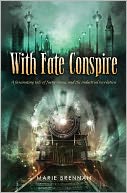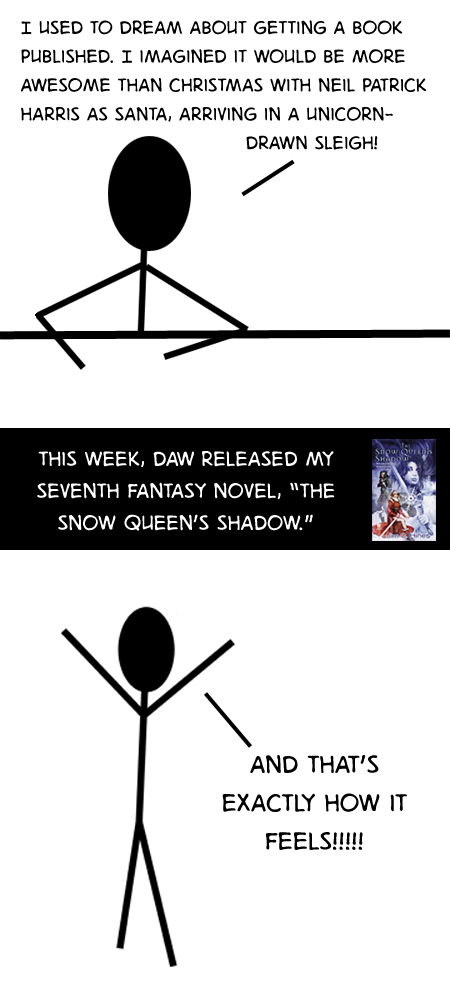My thanks to all three of my awesome guest bloggers this week! I hope you’ve all enjoyed the posts.
It seemed appropriate to wrap up the week with a guest post by the princess herself, bestselling author Alethea Kontis. She and I share a ToC in the fairy tale anthology Happily Ever After, and she has a Snow White story coming out in John Skipp’s Demons anthology this October. Her novel Enchanted will be out in the spring of next year. Find her on LiveJournal and Twitter.
#
Confessions of a Twenty-First Century Princess
By Alethea Kontis
Once upon a time, I was born. I lived in a cottage by the forest in the green mountains of the far north—home of Big Snows and Long Winters and Ben & Jerry’s Ice Cream. The cottage had electricity but little in the way of technology; whatever advancements we had were chiefly employed in the kitchen. My elder sister and brother’s father had fallen down a rabbit hole (as the children of wild aborigines are wont to do) long ago, but my parents were both my little sister’s and mine. In one way or another we were all related by blood, which is really all that matters.
Like many girls, I did not know I was a princess then. How silly I was, but then, princesses often are. My eldest sister was the most beautiful girl in the land and my little sister followed in her very fashionable footsteps. My brother was a hunter. I was a gypsy. I wore layers of skirts tied with sashes and ran wild in the forest under my brother’s watchful eye, climbing trees and making mudpies and playing pretend with the snake children. In the spring I picked Black-Eyed Susans. In the summer I lay in the field and counted the leaves on clover. In the fall I picked blackberries for pancakes and pies. The dark juices always stained my mouth and hands, betraying that as much had gone into my stomach as the basket.
I grew older and the winters grew harder, and finally my parents relented and moved south to the land of Wilting Summers and Strange Dialects and Sweet Tea. My sister and brother stayed behind in the mountains. I was the oldest child now, and it was up to me to seek my fortune in the world.
I did a terrible job of it.
Instead of living my own adventures, I lost myself in the worlds of others’ making. I packed away the skirts and locked myself away in the tower room and lamented the fact that there was no magic in the world. I believed in the Fairy Tale, truly believed, but as much as I believed I knew equally as much that there was nothing here for me. In some other world I Went on Grand Journeys and Traveled the World and Found True Love, but not in this life. I was despondent. Apathetic. I had nothing to live for. The sun that rose every morning mocked my existence. In rebellion, I began to write my own fairy tales.
And then a funny thing happened. Suddenly, there was magic in my life.
It wasn’t exactly the same magic that the Fairy Tales spoke about, with their flying men and talking animals. This was a subtle magic, and I had to learn how to look for it. It was a song or a smile, a rainbow or a penny found. The more I looked for it the more I found it…and the more I found it, the less subtle it became.
Even locked away in a tower, I found myself surrounded by witches and madmen. I had Great Love, followed by Greater Tragedy. I started wearing skirts again. I began to Travel the World. I met Amazing People of Different Cultures. I bought a sword. I was even crowned by a Queen.
But I was a princess long before that. I had just never admitted it.
You listen to me right now, you, person who is reading this blog wondering why some strange girl is prattling on about silly things like princesses where Jim normally posts nice sane and helpful things about writing. Are you listening? Good. Because I am about to tell you a secret: There is magic in this world. Magic. Capital M. Not kidding. If you’re not seeing it, then you’re not looking hard enough….but if you plan to look for it, then you better be prepared for what you’re about to find. Once you’ve seen the magic, it’s seen you too. There’s no turning back. And it grows. I would not be surprised by a flying man or a talking animal now, not one bit.
You plan on opening The Snow Queen’s Shadow this week and losing yourself in the magical world Jim’s created of snowflakes and mirrors and arrows and death. Just remember, in the back of your mind, that there is more to it than fiction, and Jim knows it.
I have already slipped between those covers and reacquainted myself with Snow and her adventures (bwahahaha). What you might see is a gorgeous, rich world you wish you could live in. What I have seen are friends I haven’t spoken to in far too long who still love me enough to remind me that I am a legendary princess of the kick-ass variety. Once a princess, always a princess. I have looked into the mirror, and the mirror has looked into me.
There is no turning back.






 Given some of the comments and e-mails I’ve been getting, I figured it was time to put together an open discussion post for The Snow Queen’s Shadow
Given some of the comments and e-mails I’ve been getting, I figured it was time to put together an open discussion post for The Snow Queen’s Shadow  For the second year in a row, I’ll be up north — likely with spotty internet access — when my book comes out. D’oh! So I invited
For the second year in a row, I’ll be up north — likely with spotty internet access — when my book comes out. D’oh! So I invited 